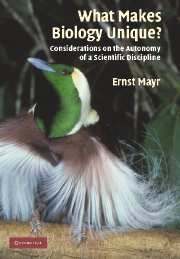Book contents
- Frontmatter
- Contents
- Preface
- Acknowledgments
- Introduction
- 1 Science and sciences
- 2 The autonomy of biology
- 3 Teleology
- 4 Analysis or reductionism?
- 5 Darwin's influence on modern thought
- 6 Darwin's five theories of evolution
- 7 Maturation of Darwinism
- 8 Selection
- 9 Do Thomas Kuhn's scientific revolutions take place?
- 10 Another look at the species problem
- 11 The origin of humans
- 12 Are we alone in this vast universe?
- Glossary
- Index
- References
Introduction
Published online by Cambridge University Press: 10 December 2009
- Frontmatter
- Contents
- Preface
- Acknowledgments
- Introduction
- 1 Science and sciences
- 2 The autonomy of biology
- 3 Teleology
- 4 Analysis or reductionism?
- 5 Darwin's influence on modern thought
- 6 Darwin's five theories of evolution
- 7 Maturation of Darwinism
- 8 Selection
- 9 Do Thomas Kuhn's scientific revolutions take place?
- 10 Another look at the species problem
- 11 The origin of humans
- 12 Are we alone in this vast universe?
- Glossary
- Index
- References
Summary
My father had a large library. Even though he was a jurist by profession, his major interests were history and philosophy, particularly the German philosophers Kant, Schopenhauer, and Nietzsche. I never read any of these philosophy books, unless one classifies Haeckel (Welträtsel) as a philosopher. However, in my parents' home philosophy was always referred to with great respect. Philosophy was the favorite reading of my father's maiden sister whom the family considered brilliant.
My real contact with philosophy, however, did not come until I prepared myself for the philosophy portion of my PhD examination. At the University of Berlin, one had to pass an examination in philosophy to complete a PhD. I took courses in the history of philosophy and a seminar in Kant's Critique of Pure Reason. Frankly, I really did not understand what it all was about. I was permitted to specify in what branch of philosophy I wanted to be examined and I was duly examined in positivism as I had specified. I passed with an A because I had been well prepared.
As a result of my studies, I concluded that the traditional philosophy of science had little if anything to do with biology. When I inquired (ca. 1926) which philosophers would be most helpful to a biologist, I was told Driesch and Bergson. When I left for New Guinea one and a half years later, the major books of these two authors were the only books I dragged around with me in the tropics for two and a half years.
- Type
- Chapter
- Information
- What Makes Biology Unique?Considerations on the Autonomy of a Scientific Discipline, pp. 1 - 10Publisher: Cambridge University PressPrint publication year: 2004
References
- 3
- Cited by

